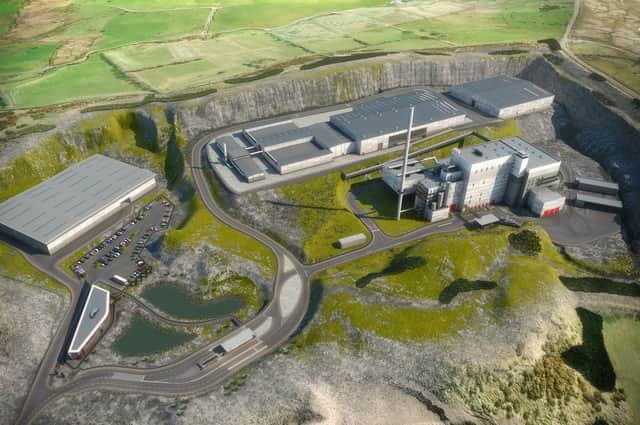Hightown waste plant planning delay could lead to crisis, group warns


Arc21, an umbrella waste management group made up of six councils in the east of Northern Ireland, has warned that almost two decades of work by the authorities and ratepayers could be undone by a potential “waste crisis”.
The group marks its 18th anniversary this year.
In that time, it said recycling rates have improved five-fold and it has helped manage 5.4 million tonnes of rubbish and contracts worth more than £400 million on behalf of its councils.
Advertisement
Hide AdAdvertisement
Hide AdHowever Alderman David Drysdale, chair of arc21’s joint committee, has raised concerns at a seven-year wait for planning permission to develop modern waste facilities at Hightown Quarry in Mallusk.
The plans include an Energy from Waste (EfW) plant to manage household waste which cannot be recycled.
Mr Drysdale said a final ministerial decision is still outstanding.
“Given the global focus on climate change at Cop26, it’s clear that we need to start taking decisions that deliver practical benefit,” he said.
Advertisement
Hide AdAdvertisement
Hide Ad“Until people stop producing so much rubbish, one of those areas is to find a better alternative to landfilling or exporting our waste overseas.
“Arc21’s proposal for new facilities at Mallusk was developed specifically to meet the needs of local councils – they’ll reduce the impact waste has on the environment, provide financial certainty for ratepayers and bring us into line with the rest of Europe.
“If we can’t progress this project, which supports the Executive’s commitment to green growth, I’m concerned that ratepayers will be exposed to the unpredictability of international waste trade markets and we will have to start looking at extending existing landfill sites or opening new ones.”
According to figures from the Department of Agriculture, Environment and Rural Affairs, Northern Ireland currently landfills or exports around 400,000 tonnes of waste annually.
Advertisement
Hide AdAdvertisement
Hide AdArc21’s proposed new facilities aim to increase recycling rates by 5%-10%, generate enough electricity to power 30,000 homes, reduce greenhouse gases by 57,000 tonnes (compared to landfill), support around 300 jobs and generate £25 million for the economy each year.
Tim Walker, arc21’s acting chief executive, said while progress has been made on waste, the “missing piece in the jigsaw” is the provision of new infrastructure for non-recyclables.
“Without these facilities, all the hard work of the past 18 years could be undone as we knowingly drift into a waste crisis caused by a lack of reliable options to manage our ever-replenishing rubbish mountain,” he said.
“The arc21 region produces 15 million wheelie bins’ worth of rubbish every year that can’t be recycled and according to the latest quarterly NI waste statistics, tonnages sent to landfill rose by 22.5%. Although the long-term recycling trend is upwards, the amount of rubbish NI councils collect is also growing, up almost 10% since 2012/13.
Advertisement
Hide AdAdvertisement
Hide Ad“Unlike the rest of Europe, we’re stuck in a waste management time-warp, reliant on landfilling our rubbish or exporting it overseas for someone else to deal with.
“Time is running out on these antiquated practices, but we have no suitable alternatives in place.
“Arc21 has a credible, ‘oven-ready’ solution that will help safeguard council services, but it will take time to commission.
“To move on from our current precarious position we just need the planning system and ministers to make an evidence-based decision.”
The Department for Infrastructure has been asked for a response.